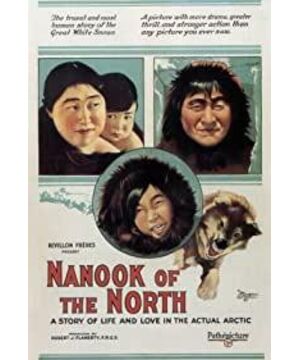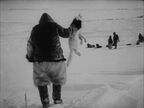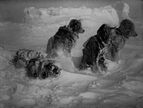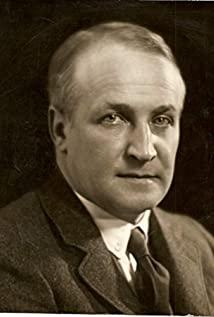If you watch a movie with compassion and suspicion, I think many people will be captured by "Nanuk of the North". This 1922 work by Robert Flahadi will ignore its landmark in documentary history. Status, just through the film itself, will see the truth of life, and trigger all kinds of associations and thinking. The Nanuks are Eskimos living in the Arctic. At that time, their lifestyle was very primitive. In the industrial age when movies were invented, there were even miniatures of primitive humans in such a harsh environment. At the same time, it feels very real. In the long evolutionary history of mankind, there is indeed a certain stage in our ancestors who survived tenaciously with such unsophisticated wisdom, fighting against the harsh conditions of nature because of the instinct for survival. I have seen the animated film "Crazy Primitives" before. Of course, the two films are very different in style. The animation is more humorous, exaggerated, and romantically expressing human evolution as a dream of "following the light". However, here, it is true. The video records it as a life of making igloos and harpoon hunting on a desolate ice field, and these have in common that human reproduction, survival, and slow evolution. The Nanuk family is not completely isolated from the world. Since there are films being shot, it shows that they have met with modern society. In my opinion, this kind of intersection is unavoidable and unfair. For example, in the trade with white people, they traded a lot of Arctic fox fur and other animal fur for things like knives, glass balls, and colorful candies. This is not equal. White people made profits by taking advantage of the great advantages of modern civilization. It reminds me of triangular trade. Is this inequality a kind of plunder? But even in a backward civilization, there is still the beauty of human nature that can instantly melt the soul. Even if it is a dog pulling a sled, the whole family is walking hard in the ice and snow, just like Jack London has repeatedly described in the novel, they still often smile in front of the camera, the kind of simple and simple smile, and even Such a scene: Nanuk caught a white fox on the way and tied it to a sled. A female member of the family pressed her face and back to tease it, even though she was migrating in wind and snow. But this scene is really cute. I also noticed that when they ate their prey raw, they also had a satisfied and heartfelt smile. And Nanuk taught children how to archery. He used snow to build small animals, and he used his face to warm the children's cold hands from archery, full of pure love between father and son. So I'm wondering whether we are inferior to primitive humans in certain aspects of spirit when our material life becomes more convenient today. For example, many very precious time with relatives, frank meeting between people, not too much desire satisfaction, not too numb, too heavy soul. I was deeply impressed by this film that I watched in the English class. I then checked the relevant information, but I was surprised to find that the Nanuk family had cooperated with the documentary shortly after the author left. Filming did not save enough food for the winter and finally starved to death. It is also said that he personally died in a hunting. Maybe this is impossible to verify, but it always casts a layer of sadness on the film. And people have disputes about whether this documentary is "positioned" or not. It is difficult to have definite answers to these questions, but the documentary will gradually develop during the dispute. Even if "Nanuk in the North" is an imperfect film, I still think it is very successful, because at least it gives people moving and thinking. These black and white images about life, the past and reality of mankind are precious enough. . I was deeply impressed by this film that I watched in the English class. I then checked the relevant information, but I was surprised to find that the Nanuk family had cooperated with the documentary shortly after the author left. Filming did not save enough food for the winter and finally starved to death. It is also said that he personally died in a hunting. Maybe this is impossible to verify, but it always casts a layer of sadness on the film. And people have disputes about whether this documentary is "positioned" or not. It is difficult to have definite answers to these questions, but the documentary will gradually develop during the dispute. Even if "Nanuk in the North" is an imperfect film, I still think it is very successful, because at least it gives people moving and thinking. These black and white images about life, the past and reality of mankind are precious enough. . I was deeply impressed by this film that I watched in the English class. I then checked the relevant information, but I was surprised to find that the Nanuk family had cooperated with the documentary shortly after the author left. Filming did not save enough food for the winter and finally starved to death. It is also said that he personally died in a hunting. Maybe this is impossible to verify, but it always casts a layer of sadness on the film. And people have disputes about whether this documentary is "positioned" or not. It is difficult to have definite answers to these questions, but the documentary will gradually develop during the dispute. Even if "Nanuk in the North" is an imperfect film, I still think it is very successful, because at least it gives people moving and thinking. These black and white images about life, the past and reality of mankind are precious enough. .
View more about Nanook of the North reviews








